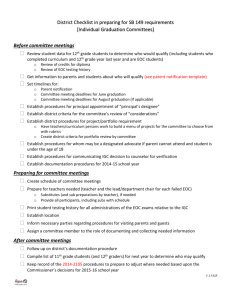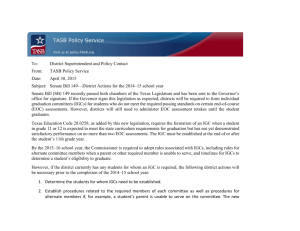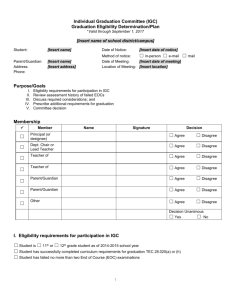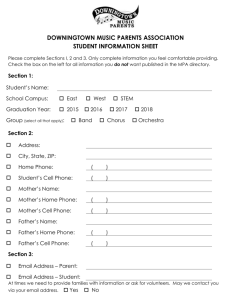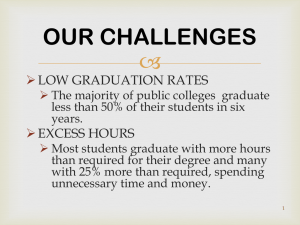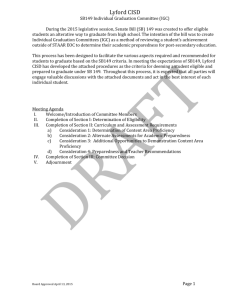Purpose of Individual Graduation Committee (Pasadena ISD)
advertisement
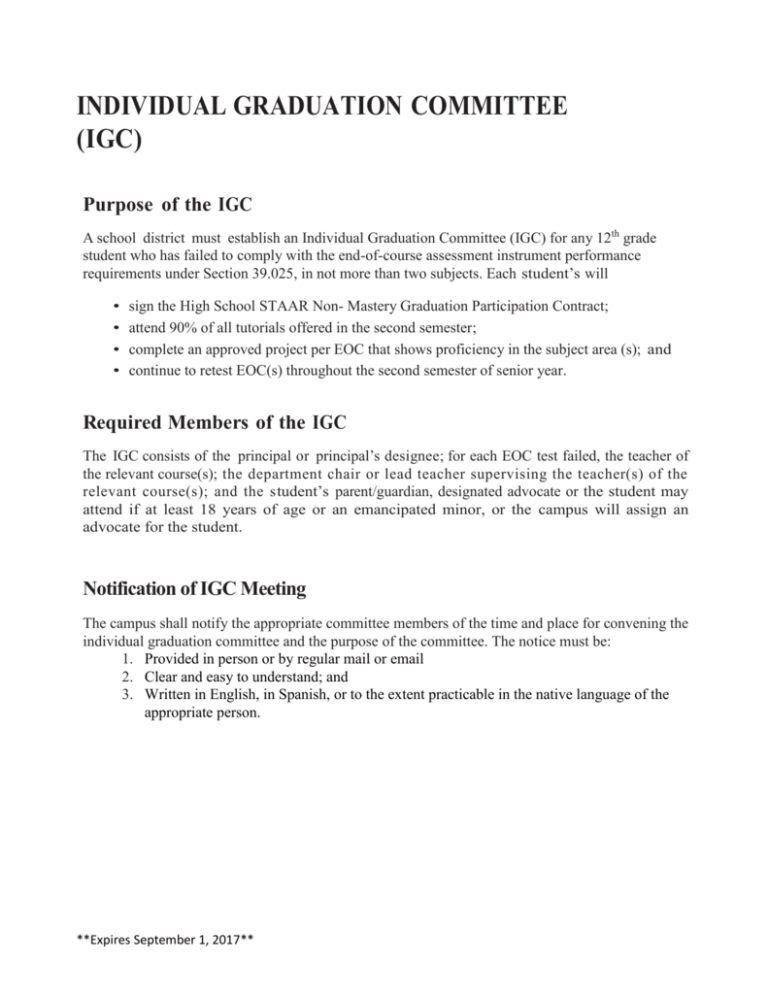
INDIVIDUAL GRADUATION COMMITTEE (IGC) Purpose of the IGC A school district must establish an Individual Graduation Committee (IGC) for any 12th grade student who has failed to comply with the end-of-course assessment instrument performance requirements under Section 39.025, in not more than two subjects. Each student’s will • • • • sign the High School STAAR Non- Mastery Graduation Participation Contract; attend 90% of all tutorials offered in the second semester; complete an approved project per EOC that shows proficiency in the subject area (s); and continue to retest EOC(s) throughout the second semester of senior year. Required Members of the IGC The IGC consists of the principal or principal’s designee; for each EOC test failed, the teacher of the relevant course(s); the department chair or lead teacher supervising the teacher(s) of the relevant course(s); and the student’s parent/guardian, designated advocate or the student may attend if at least 18 years of age or an emancipated minor, or the campus will assign an advocate for the student. Notification of IGC Meeting The campus shall notify the appropriate committee members of the time and place for convening the individual graduation committee and the purpose of the committee. The notice must be: 1. Provided in person or by regular mail or email 2. Clear and easy to understand; and 3. Written in English, in Spanish, or to the extent practicable in the native language of the appropriate person. SSI Topics **Expires September 1, 2017** Requirements of student for IGC To be eligible to graduate and received a high school diploma, a student must successfully complete the curriculum requirements. The student’s individual graduation committee established under the state law must recommend additional requirements by which the student may qualify to graduate including: 1. Additional remediation; and 2. For each end-of-course assessment instrument on which the student failed to perform satisfactorily: a. The completion of a project related to the subject area of the course that demonstrates proficiency in the subject area; or b. The preparation of a portfolio of work samples in the subject area of the course, including work samples from the course that demonstrate proficiency in the subject area. The IGC must consider these 15 sources of information: 1. Relevant teacher’s or teachers’ recommendation(s) 2. Relevant course grades 3. Earned scores on relevant EOC test(s) 4. Performance on the committee-required additional measures 5. Number of hours of remediation attended, including completion of college preparatory courses under Ch. 39 [Note: These have not been implemented yet] or attendance and successful completion of “transitional” college reading or mathematics courses 6. School attendance rate 7. Attainment of any of the TSI benchmarks approved by THECB (SAT, ACT, Alg. II EOC or English III EOC test) 8. Completion of a dual credit course in the four core subject areas 9. Completion of a pre-AP, AP, or IB course in the four core subject areas 10. Advanced High performance on TELPAS 11. Scores of 50 or greater on CLEP tests 12. Scores on ACT, SAT, or ASVAB 13. Completion of sequence of CTE courses required to attain an industry-recognized credential or certificate 14. Overall preparedness for postsecondary success 15. Any other academic information designated for consideration by local school board Qualifying for Graduation To qualify for a graduation diploma, the student must meet all the above requirements and the committee members must have a unanimous vote. The decision of the committee is final and may not be appealed. **Expires September 1, 2017** Scenario: A special education student currently receives regular curriculum in core classes and is taking all End of Course STAAR exams without modifications. Normally during a graduation ARD, the ARD committee waives the EOC tests that the student has not mastered. The graduation coding changes from the G28 Recommended to G19 Special Education Recommended. Technically this student should be eligible to graduate with a diploma through an Individual Graduation Committee. Donna Summers is check on how it affect accountability. The law has not mentioned how these Special Education students will be affected, therefore Compliance Monitoring is working on a plan. The ultimate goal is that these Special Education students are coded Recommended - G28 and not G19 - Sped Recommended. **Expires September 1, 2017**
